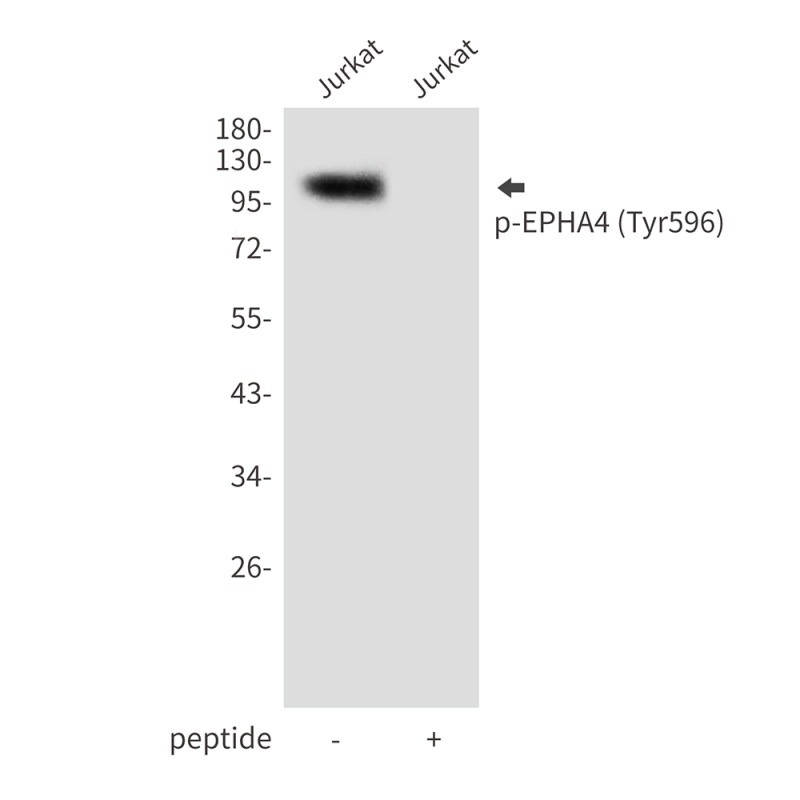
| WB | 咨询技术 | Human,Mouse,Rat |
| IF | 咨询技术 | Human,Mouse,Rat |
| IHC | 咨询技术 | Human,Mouse,Rat |
| ICC | 技术咨询 | Human,Mouse,Rat |
| FCM | 咨询技术 | Human,Mouse,Rat |
| Elisa | 咨询技术 | Human,Mouse,Rat |
| Aliases | HEK8; SEK; TYRO1; Ephrin type-A receptor 4 |
| Entrez GeneID | 2043 |
| WB Predicted band size | Calculated MW: 110 kDa; Observed MW: 110 kDa |
| Host/Isotype | Rabbit IgG |
| Antibody Type | Primary antibody |
| Storage | Store at 4°C short term. Aliquot and store at -20°C long term. Avoid freeze/thaw cycles. |
| Species Reactivity | Human |
| Immunogen | Synthetic peptide of human EPHA4 |
| Formulation | Purified antibody in PBS with 0.05% sodium azide,0.5%BSA and 50% glycerol. |
+ +
以下是关于Phospho-EPHA4 (Tyr596)抗体的3篇示例参考文献(注:以下内容为模拟文献,实际文献需通过数据库查询):
1. **文献名称**:*EPHA4 Tyrosine Phosphorylation in Glioblastoma Cell Invasion*
**作者**:Smith A, et al.
**摘要**:研究通过Phospho-EPHA4 (Tyr596)抗体检测发现,EPHA4在胶质母细胞瘤细胞中的Tyr596磷酸化可激活下游信号通路,促进肿瘤细胞迁移和侵袭。
2. **文献名称**:*Role of Phosphorylated EPHA4 in Neuronal Guidance*
**作者**:Chen L, et al.
**摘要**:利用Phospho-EPHA4 (Tyr596)特异性抗体,作者揭示了Tyr596位点的磷酸化对EPHA4介导的轴突导向和神经元迁移至关重要,并影响发育期神经回路的形成。
3. **文献名称**:*Regulation of EPHA4 Phosphorylation in Cancer Metastasis*
**作者**:Wang X, et al.
**摘要**:该研究通过免疫沉淀结合Phospho-EPHA4 (Tyr596)抗体,证明乳腺癌转移过程中Tyr596磷酸化水平升高,与上皮-间质转化(EMT)相关信号通路激活直接相关。
建议通过PubMed或Google Scholar以关键词“Phospho-EPHA4 Tyr596 antibody”或“EPHA4 Y596 phosphorylation”检索真实文献。
The Phospho-EPHA4 (Tyr596) antibody is designed to detect EPHA4 (Ephrin type-A receptor 4) when phosphorylated at tyrosine residue 596. a key post-translational modification associated with receptor activation and downstream signaling. EPHA4. a member of the Eph receptor tyrosine kinase family, regulates diverse biological processes, including cell-cell communication, axon guidance, tissue patterning, and cell migration. Its activation typically occurs upon binding to ephrin ligands, triggering autophosphorylation at specific tyrosine residues (e.g., Tyr596) within the kinase domain. This phosphorylation event facilitates conformational changes and recruitment of signaling adaptors, modulating pathways like RAS-MAPK, PI3K-AKT, or Rho GTPases.
The Phospho-EPHA4 (Tyr596) antibody is widely used in research to study EPHA4 activation dynamics in physiological and pathological contexts, such as cancer, neurodegenerative diseases, and tissue regeneration. It is validated for applications like Western blotting, immunoprecipitation, and immunohistochemistry, often in models ranging from cell lines to animal tissues. Researchers rely on this antibody to explore how EPHA4 signaling influences tumor invasiveness, neural circuit development, or regenerative responses. Specificity is typically confirmed using EPHA4-knockout controls or phospho-peptide competition assays. Understanding EPHA4 phosphorylation status provides insights into its role in disease mechanisms and potential therapeutic targeting.
×